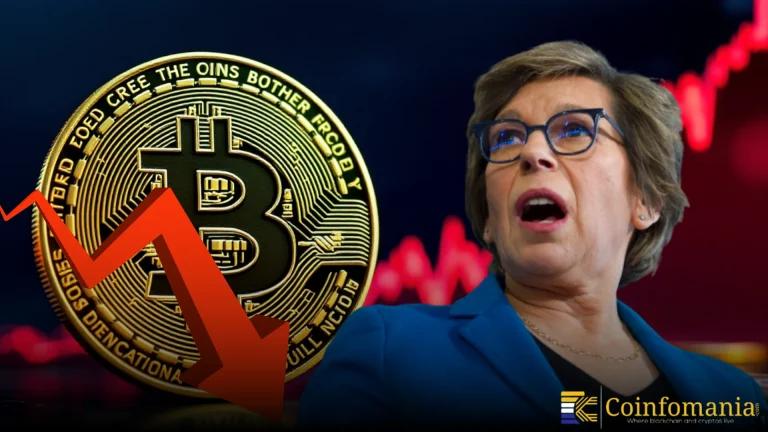Gracy Chen Says GENIUS Act Aims to Restore U.S. Crypto Pricing Power
Dive into the GENIUS Bill and Gracy Chen’s analysis on how stablecoin rules could reshape U.S. control over digital finance markets.

Quick Take
Summary is AI generated, newsroom reviewed.
Bitget CEO Gracy Chen described the GENIUS Bill as a strategic move to regulate crypto markets through USD-backed stablecoins.
The bill requires stablecoins to maintain 100% reserves in U.S. dollars or Treasuries, directing global liquidity into American assets.
The bill marks a key step in structured U.S. crypto policy, aiming to reinforce US crypto dominance globally.
On May 21, Bitget CEO Gracy Chen shared her analysis on the U.S. Senate’s passing of the GENIUS Act. She described it as a strategy to control crypto markets using stablecoins. Officials plan to use U.S. dollar stablecoins instead of issuing a CBDC. This approach aims to influence digital asset prices without expanding the money supply. According to her analysis, this plan leverages liquidity as an economic tool, creating a key moment in digital finance policy.
New U.S. Stablecoin Rules Aim to Channel Global Liquidity
The GENIUS Bill mandates that all eligible stablecoins hold 100% reserves in USD or Treasuries. Lawmakers intend this rule to fortify market stability and investor confidence. It also aims to drive demand for U.S. government debt instruments. This process will channel global crypto liquidity into American financial products. The measure seeks to limit algorithmic and foreign-backed stablecoin influence. Supporters say such a shift reinforces U.S. monetary presence on blockchain networks. Critics caution that strict reserve rules could stifle innovation in DeFi projects. Lawmakers hope to balance financial safety with healthy market competition.
In March, Bitget CEO Gracy Chen outlined a plan using digital dollars and Bitcoin. She argued that private firms could issue Treasury-backed stablecoins instead of a CBDC. This method maintains monetary control without direct government coin issuance. Chen suggested Bitcoin could serve as a strategic reserve asset for the nation. She proposed acquiring digital gold through asset swaps rather than taxpayer purchases. Her view emphasized market-driven actions instead of inflationary fiscal measures. That analysis anticipated stablecoin reform influencing digital asset markets in the coming years. Many observers now link the GENIUS Act to those March predictions. This growing alignment highlights increased focus on structured crypto strategies.
Digital Asset Growth Tied to Broader Economic Policy Planning
Chen also discussed a controlled economic slowdown to prompt future rate reductions. This phase could trigger liquidity restoration through central bank actions. She referred to this scenario as part of a broader strategy for growth. The aim was to set the stage for stronger digital asset demand. She predicted Bitcoin would remain above seventy thousand dollars after dips. Temporary price falls could offer buying chances for patient investors. Those ideas appear to have influenced aspects of the final GENIUS Act. This coordination of policy and market signals reflects evolving digital finance planning.
Industry Leaders Respond to GENIUS Bill with Optimism
Other Industry leaders have also commented on the new legislation. Coinbase’s CEO praised this outcome as beneficial for on-chain innovation in America. The company’s policy chief publicly thanked senators who supported the measure. Their responses highlight the bill’s potential to shape future stablecoin rules. These remarks underline the shared goal of reinforcing US crypto dominance. Other experts saw this as a positive signal for market certainty. This broad approval suggests a growing consensus on balancing innovation and security. Stakeholders expect clearer guidelines for stablecoins from federal regulators next.
The GENIUS Bill received support from both political parties in Congress. Observers view the bipartisan backing as proof of the importance of digital finance. Justin Sun called the passage a monumental day for American blockchain efforts. Chris Burniske noted that Ethereum’s DeFi network could gain significant advantages. Experts believe U.S. stablecoin markets may build on existing infrastructure. This coalition highlights a shared vision for regulated digital currency systems. Many see this momentum as helping U.S. crypto firms compete globally. Bipartisan endorsement may also reduce legislative uncertainty around crypto policy.
GENIUS Act as a Framework for Future Digital Asset Governance
The GENIUS Bill forms part of a strategy to deepen U.S. dollar use in crypto. By backing stablecoins with federal securities, the bill aims to guide global liquidity flows. This approach avoids direct money printing while maintaining monetary influence abroad. As such, this strategy is linked to broader goals of US crypto dominance. Pairing regulated stablecoins with Bitcoin reserves suggests a layered financial plan. This non-CBDC route signals a preference for private sector market solutions. Observers expect this framework to guide digital asset policy in the coming years. It may shape how the U.S. exerts financial influence through crypto channels.
References
Follow us on Google News
Get the latest crypto insights and updates.


